Related Research Articles

The Asian Games, also known as Asiad, is a continental multi-sport event held every fourth year among athletes from all over Asia. The Games were regulated by the Asian Games Federation (AGF) from the first Games in New Delhi, India in 1951, until the 1978 Games. Since the 1982 Games, they have been organized by the Olympic Council of Asia (OCA), after the breakup of the Asian Games Federation. The Games are recognized by the International Olympic Committee (IOC) and are described as the second largest multi-sport event after the Olympic Games.
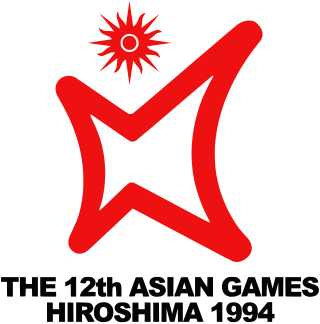
The 1994 Asian Games, also known as the XII Asiad and the 12th Asian Games, were held from October 2 to 16, 1994, in Hiroshima, Japan. The main theme of this edition was to promote peace and harmony among Asian nations. It was emphasized by the host because the venue was the site of the first atomic bomb attack 49 years earlier. Due to the 1991 Gulf War, Iraq was suspended from the games. The games debuted former republics of the Soviet Union: Kazakhstan, Kyrgyzstan, Tajikistan, Turkmenistan, and Uzbekistan.
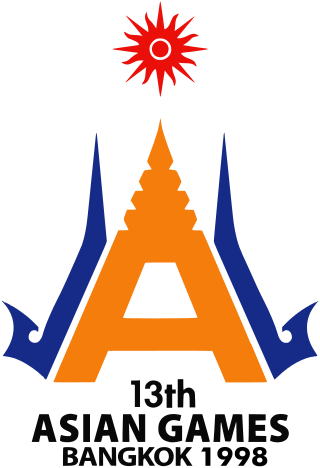
The 1998 Asian Games, officially known as the 13th Asian Games and the XIII Asiad, was an Asian multi-sport event celebrated in Bangkok, Thailand from December 6 to 20, 1998, with 377 events in 36 sports and disciplines participated by 6,554 athletes across the continent. The football event commenced on 30 November 1998, a week earlier than the opening ceremony.

The 2010 Asian Games, officially known as the XVI Asian Games and also known as Guangzhou 2010, were a regional multi-sport event that had taken place from November 12 to 27, 2010 in Guangzhou, Guangdong, China. It was the second time China hosted the Asian Games, with the first one being Asian Games 1990 in Beijing.

The 6th Asian Winter Games were held in Changchun, Jilin, China from January 28 to February 4, 2007. The Winter Games are a celebration of Winter sports in Asia. This was the second time that China hosted the Asian Winter Games; the first was in Harbin, Heilongjiang in 1996.
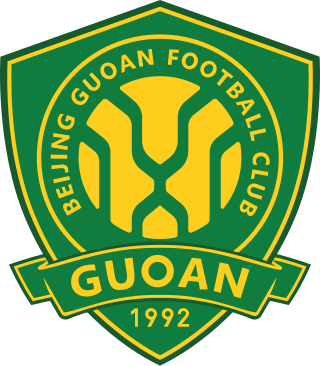
Beijing Guoan Football Club, known internationally as Beijing FC, is a Chinese professional football club based in Beijing, that competes in the Chinese Super League, the top tier of Chinese football. Beijing Guoan plays its home matches at the Workers' Stadium, located within Chaoyang District. In early 2021, the shareholders changed from the real estate company Sinobo Group (64%) and CITIC Limited (36%) of CITIC Group to just Sinobo Group (100%). Beijing Guoan is one of the four clubs to have never been relegated from the Chinese top-flight since the Chinese Super League's foundation in 2004.
Badminton has been one of the regular Asian Games sports since 1962 in Jakarta, Indonesia.
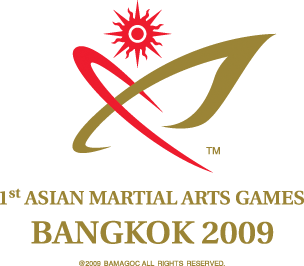
2009 Asian Martial Arts Games, the 1st and only Asian Martial Arts Games in history were a pancontinential martial arts multi-sport event held in Bangkok, Thailand from 1 to 9 August 2009 with 9 events contested. Due to Political crisis in Thailand And 2009 Swine Flu, the Bangkok Asian Martial Arts Games Organizing Committee (BAMAGOC) and the National Olympic Committee (NOC) of Thailand decided that Asian Martial Arts Games moved from the original schedule of 25 April to 3 May to 1 to 9 August. Four years later, the event merged with another Olympic Council of Asia (OCA) event – Asian Indoor Games to form the larger Asian Indoor and Martial Arts Games.

The Asian Para Games, also known as Para Asiad, is a multi-sport event regulated by the Asian Paralympic Committee that's held every four years after every Asian Games for athletes with physical disabilities. Both events had adopted the strategy used by the Olympic and Paralympic Games of having both games in the same city. However, the exclusion of Asian Para Games from Asian Games host city contract meant that both events ran independently of each other. The Games are recognized by the International Paralympic Committee (IPC) and are described as the second largest multi-sport event after the Paralympic Games.

People's Republic of China first competed at the Asian Games in 1974. During that year, China became the second nation in the history of Asian Games after Japan to cross the 100 medal-mark in one edition.

Japan has competed at the Asian Games since their inception in 1951, held in New Delhi, India. The National Olympic Committee of Japan, Japanese Olympic Committee, is responsible for organizing Japan's participation in the Asian Games. The Committee was established in 1911 and recognized by the International Olympic Committee in 1912; it is also the oldest Asian National Olympic Committee. Japan has a distinguished achievement among all Asian sport teams, being the only one to have won at least 20 gold medals at every Asian Games.
Ramada Asia-Pacific is the regional arm of the Ramada International hotel chain operated by the Wyndham Hotel Group. The Wyndham Hotel Group franchises hotels and provides property management services around the globe.
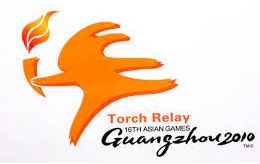
The 2010 Asian Games torch relay was held from October 12, 2010 through 21 cities in Guangdong province and 2 cities outside the province before the opening ceremony on November 12, 2010. Prior to the relay, a lighting ceremony was held back on October 9, 2010. Some 2,068 torchbearers were expected to carry the torch. The relay leg in Harbin was held in a minor scale due the climatic conditions,as the leg was held inside the main venue of the 1996 Asian Winter Games complex, the Harbin Ice Hockey Rink, while the relay on October 22, 2010 was affected by Typhoon Megi as it was held under the rain. The leg held from November 6–8 acted as a test relay. The flame travelled across China aboard a China Southern Airlines Airbus A330-200 named "Flight Guangzhou 2010", with the airline company being the official partner of the games.

The 2010 Asian Games, also known as the XVI Asiad, was a multi-sport event held in Guangzhou, China from 12 to 27 November 2010. The event saw 9,704 athletes from 45 National Olympic Committees (NOCs) competing in 476 events in 42 sports. This medal table ranks the participating NOCs by the number of gold medals won by their athletes.
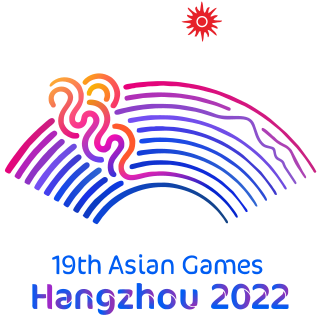
The 2022 Asian Games, officially the 19th Asian Games and also known as Hangzhou 2022, was a continental multi-sport event which was held from 23 September to 8 October 2023 in Hangzhou, China. The games marked the 110th anniversary since the creation of the first continental event, starting with the 1913 Far Eastern Championship Games.
Dancesport is a competitive team sport which includes ballroom dancing. The sport became a part of the Asian Games as a medal sport in 2010 in Guangzhou, People's Republic of China. International governing body of Dancesport, World DanceSport Federation, was recognized by the International Olympic Committee in 1995, and subsequently in 1997 the Asian representative of the sport, Asian DanceSport Federation, was recognized by the Olympic Council of Asia. After the recognition of the Asian DanceSport Federation, the sport was demonstrated at the 1998 Asian Games in Bangkok, Thailand.

Kazakhstan participated in the 1994 Asian Games from October 2 to October 16, 1994 in Hiroshima, Japan, which was the country's first appearance at the Asian Games since gaining independence.
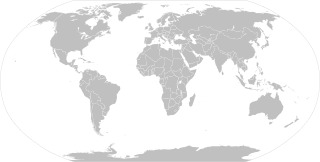
Three cities submitted bids to host the 2018 Asian Games that were recognized by the Olympic Council of Asia (OCA). The games were awarded to Hanoi, Vietnam. The other shortlisted city was Surabaya, Indonesia. This came after Dubai and the United Arab Emirates pulled out of the running at the last minute during the Olympic Council of Asia (OCA) General Assembly meeting on November 8, 2012.
Bids for the Asian Games is the process where National Olympic Committees select from within their national territory cities to put forward bids to host an Asian Games.
References
- ↑ "12th Asian Games Hiroshima 1994 - Poppo & CuCCu". GAGOC. gz2010.cn (official website of 2010 Asian Games). April 27, 2008. Retrieved May 26, 2011.
- ↑ "13th Asian Games Bangkok 1998 - Chai-Yo". GAGOC. gz2010.cn (official website of 2010 Asian Games). April 27, 2008. Archived from the original on October 28, 2011. Retrieved May 26, 2011.
- ↑ "Mascot, Busan 2002". OCA. Archived from the original on 2010-06-16. Retrieved 2010-11-20.
- ↑ "Mascot of Asian Games 2006". Travour.com. 2006-12-05. Archived from the original on 2008-02-16. Retrieved 2011-05-02.
- ↑ "Mascot of 2007 Changchun Asian Winter Games". Archived from the original on 2012-03-02. Retrieved 2012-09-09. China.com-Mascot of 2007 Changchun Asian Winter Games
- ↑ "Mascot for 16th Asian Games to be held in 2010 unveiled". Beijing2008.cn. April 29, 2008. Archived from the original on October 29, 2010. Retrieved June 30, 2010.
- ↑ The Mascot-IRBY
- ↑ Xinhua (2010-11-05). "Mascots, emblem for 2014 Incheon Asian Games unveiled". China Daily. Retrieved 2010-11-05.
- ↑ "Sapporo 2017 entry deadline approaches for NOCs". www.ocasia.org/. Olympic Council of Asia. 24 March 2016. Retrieved 29 December 2016.[ permanent dead link ]
- ↑ "Logo & Mascot 18th Asian Games 2018" (PDF). Archived from the original (PDF) on 21 October 2016.
- ↑ "Male robot triplets unveiled as Hangzhou Asian Games mascots". hangzhou2022.cn. Hangzhou Asian Games Organising Committee. 3 April 2020. Archived from the original on 13 September 2020. Retrieved 9 April 2020.
- ↑ Mascots for 3rd Asian Beach Games unveiled
- ↑ "Olympic Council of Asia : Photo Details". Archived from the original on 2016-02-03. Retrieved 2018-11-18.
- ↑ "Olympic Council of Asia : Photo Details". Archived from the original on 2016-03-04. Retrieved 2020-02-29.
- ↑ "Mascot, Bangkok 2009 - Hanuman, God King of the Apes". 2009-04-15. Archived from the original on 2016-09-18. Retrieved 2009-04-15.
- ↑ "Ashgabat 2017 unveil mascot with 200 days to go". insidethegames.biz. 2017-03-01. Retrieved 2017-03-05.
- ↑ "ลงตัวแล้ว ตรา-มาสคอต เอเชียนอินดอร์ฯ ชี้หากยังมีโควิดเลื่อนอีก" (in Thai). SMM Sport. Retrieved 4 April 2021.
- ↑ "Mascot for 1st Asian Youth Games in Singapore named Frasia". Channel NewsAsia. April 15, 2009. Retrieved 2009-04-15.[ dead link ]
- ↑ "Singapore Sports AYG 2009". Singapore Sports Council. May 16, 2009. Archived from the original on 2009-03-31. Retrieved May 16, 2009.
- ↑ "Mascot for 2nd Asian Youth Games unveiled". JSCHINA. Retrieved 24 December 2012.
